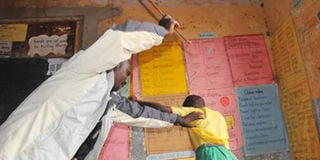There are better ways of disciplining learners

Joseph Okello, a father of one says there are many ways of instilling morals in children without having to cane them. Okello argues that discipline begins from home not school.
This month, two Primary Two pupils died in a space of two weeks because of corporal punishment.
The most recent incident happened last week. Daily Monitor published a story of six-year-old Albaqueen Kainerugaba, a top class pupil at Home Kindergarten in Najeera Township, a city suburb. Kainerugaba died after allegedly being beaten by a teacher.
Kampala Metropolitan spokesperson Patrick Onyango revealed that after the incident, the child developed health complications and was taken to Mulago Hospital, where she died.
Police later arrested and detained the school director, head teacher and teacher on charges of murder and negligence.
Unfortunately, Kainerugaba’s case is not the first.
On March 5, Daily Monitor reported that Police in Kawempe arrested a bricklayer on accusations of killing his seven-year-old daughter for not doing homework.
The father allegedly returned home at 7pm and asked his daughter Irene Nambalirwa whether she had done homework. Nambalirwa who was in Primary Two at Eria Memorial Primary School in Lugoba, Kawempe said she hadn’t. According to police, he then pounced on his daughter and beat her to death.
Punishing children
Joseph Okello, a father of one says there are many ways of instilling morals in children without having to cane them. Okello argues that discipline begins from home not school.
“Usually, students that are well-trained and disciplined at home behave well at school,” he says, adding that, “Parents have to set a strict code of conduct for students right from home so they can grow up in a set line.” However, he also has an alternative view on disciplining children.
Alternative view
He says many times children do wrong things because they are still growing and are and are adventurous. It, therefore, takes a whole new understanding by those assigned to take care of these children to help them develop mentally.
“Beating is not a good tool for discipline. Personally, I have used various ways to show a child that they have done wrong, without necessarily hurting their bodies.”
Questionable options
There’s a common joke about a typical African mother’s way of disciplining a child. A side look from the corner of her eye or a sarcastic joke is enough to inform a child of imminent danger. Many times, this is meant make the child aware of their wrong doing.
This kind of punishment according to some parents is good. Jerusha Bazanama doesn’t believe beating is a good form of punishment. She says isolation can change a child’s way of thinking and make them realise they are in the wrong.
“Put them in a room alone, or even a classroom corner for an hour. Tell them why they have been isolated. Next time they will do better,” she says.
Alice Bongyeirwe, a parent, shares that years back her children said they were subjected to isolation at school every time they did something wrong.
“I thought this was not punishment but my children told me it made them feel bad,” she says. The children told her one would stay in the corner for hours on top of being denied other things like going for breakfast.
She says at some kindergartens, children are given star stickers on their foreheads. If a child does something wrong, they are not given one.
“Singing for a child for their unbecoming behaviour will also to make them realise their wrong doing,” Bongyeirwe notes.
Experts’ view
According to Elizabeth Asaba, a head teacher at Ikoba Girls’ Primary School in Masindi District, the recent incidents are extreme cases of corporal punishment. She says the two incidents represent many theories around beating. Asaba notes that there are chances that some children are beaten at all by their parents.
She says before a child is beaten, a child must be told in advance to psychologically prepare them for it. Asaba says the Ministry advises that schools should give light punishment to pupils such as guidance and counselling instead of beating.
However, she says beating is still being done by some schools since some children take light punishments for granted.



